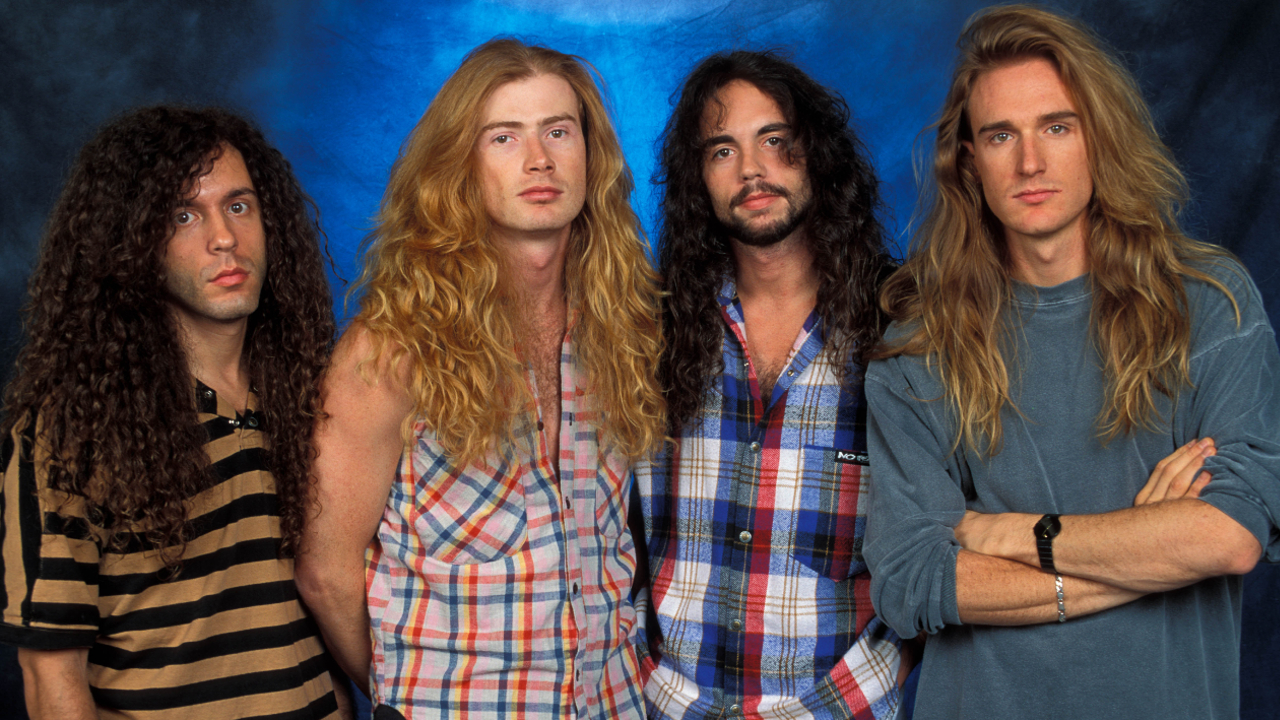
What’s the best thrash metal album of all time? While most people would probably answer with Metallica’s Master Of Puppets, or even Slayer’s Reign In Blood, it’s Rust In Peace that’s the true dark horse for the genre’s diehards.
On their seminal fourth album, Megadeth brought speed metal’s obsession with technicality and politics to its apex. Dave Mustaine and Marty Friedman trade callus-blistering guitar leads for much of the 41-minute run-time, yet the band also never skimp on the hooks and melodies needed for top-notch songs. This has resulted in such standouts as Holy Wars… The Punishment Due and Tornado Of Souls staying in metalheads’ regular rotation for upwards of 30 years.
Here’s everything you need to know about this incensed classic, broken down from track to track:

Holy Wars… The Punishment Due
Famously, Holy Wars was inspired by that time Dave Mustaine incited a riot. Megadeth were playing a show in Ireland at the height of The Troubles and the singer/guitarist dedicated a cover of Anarchy In The UK to “the cause”, AKA the IRA. “Later, when I was alone, I wondered why the fuck I’d done that,” Dave later told Classic Rock. The middle section of the band’s signature song, The Punishment Due, pays tribute to Marvel Comics antihero The Punisher.
Hangar 18
Dave first came up with Hangar 18 in Panic: his short-lived first band. However, the song was also one of the last to be finished during the Rust In Peace sessions. The lyrics are based on a real hangar near Dayton, Ohio, which, according to a conspiracy theory, houses the wreckage from the 1947 Roswell UFO crash. “Nick Menza, our drummer, is way into this stuff,” Dave told MTV in 1991. “Maybe he’s just a little bit more gullible than I am!”
Take No Prisoners
One of the album’s more meat-and-potatoes thrash songs, Take No Prisoners is a three-and-a-half-minute tirade against the American military. “I’ve been on the USS George Washington, which is an amazing aircraft carrier,” Dave told Consequence Of Sound in 2019. “To think that they’ve got 18-, 19-, 20-year-old guys driving these $100 million, and even sometimes close to billion-dollar, vessels… And you’re thinking, ‘God, this guy's not even old enough to buy a beer. Oh my gosh!’ So that’s kind of what that was.”
Five Magics
After Take No Prisoners’ white-knuckle thrash, Five Magics toys with pace. It darts from all-out speed to some psychedelic groove from Marty Friedman and bassist Dave Ellefson, then accelerates to full throttle again. The song is also one Megadeth’s very few to be based on a fiction book: the title and lyrics were both inspired by the 1980 Lyndon Hardy fantasy novel Master Of The Five Magics, about a young wizard who has to, well… master five magics and overthrow an evil overlord.
Poison Was The Cure
One of Rust…’s slowest and fastest songs, Poison Was The Cure rises from a pensive Dave Ellefson bass section to unapologetically quick riffing. The three-minute ripper had been with Megadeth for a while, since 1986’s Peace Sells… But Who’s Buying?, but wasn’t ready until four years later. The lyrics reflect on Dave Mustaine’s heroin addiction and the dependence he had on the drug, despite its life-shattering damage: ‘Secure and safe in open arms / I should have known you’d crush me.’
Lucretia
Lucretia is commonly said to be about (and named after) a ghost that lived in Dave Mustaine’s attic. However, in a 2008 Q&A, MegaDave dismissed this. “Lucretia was a story I made up,” he said. “The name came from Lucrezia Borgia, who was supposed to have been a gipsy that was a magic woman.” The song is one of the most accessible on the album, opening with a jangling guitar melody before breaking down into a series of simple yet heavy chords.
Tornado Of Souls
Tornado Of Souls is the most personal moment on Rust…. Its lyrics tackle the end of Dave Mustaine’s relationship with his ex-fiancee, Diana: “Lyrical references aside, it was not a song about murder or death,” the musician said in his 2022 autobiography. “It was about the decay that comes with being stuck in a bad relationship.” The track’s also the album’s sleeper hit, its chorus and impressive pinch harmonics thrusting it into many ‘best Megadeth song’ rankings, despite it never being a single.
Dawn Patrol
A simplistic segue between the more maximalist Tornado… and Rust In Peace… Polaris, Dawn Patrol emphasises Dave Ellefson’s swaggering bass and Dave Mustaine’s spoken-word vocals. The lyrics narrate the horrors of a nuclear holocaust. According to Ellefson, Dawn Patrol was the last song added to Rust…, as Megadeth’s management thought the album was slightly too short: “Listening back to the album now, that tune became a nice break [from] the onslaught of the other songs,” he said in 2011.
Rust In Peace… Polaris
Following on from Dawn Patrol, Rust In Peace… Polaris again tackles the subject of nuclear annihilation – albeit with a more optimistic outlook. The lyrics predict that nuclear warheads, like the Polaris missile owned by the US Navy, will ultimately never be used and instead “rust in peace”. That line, and by extension the album’s title, came from a bumper sticker that Dave Mustaine once saw while driving in California: “May all your nuclear weapons rust in peace,” it read.







